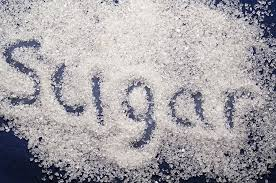When it comes to health, sugar has a two-edge sword reputation. They
occur naturally in carbohydrate-containing foods such as fruits, vegetables,
whole grains, dairy, legumes etc. Consuming foods with minimal
processing contain healthy sugar. Aside from the healthy sugar contents of these
foods, they also have high amounts of fibre, essential minerals, and
antioxidants, and dairy foods contain protein and calcium. A high intake of
fruits, vegetables, and whole grains also has been shown to reduce the risk of
chronic diseases, such as diabetes, heart disease, and some cancers.
Added sugars and concentrated sweets such as soft drinks, cakes,
pies, etc contribute discretionary calories to the diet with little or no
other nutrients should not form a major part of one’s food intake.
Moderate amounts of sugar pose no major
health risk, but in excess, can be detrimental in two ways. It can contribute
to nutrient deficiencies by supplying energy (calories) without providing
nutrients while contributing to tooth decay. High intakes of sugar have also been shown to increase the risk of obesity.
Sugar and nutrient
deficiencies
High energy foods contain lots of added sugars such as cakes, candies, and sodas that provide the body with glucose and energy, but few, (if any) other nutrients, compared to naturally occurring foods that contain natural sugars and lots of starches, protein, vitamins, and minerals.
For instance, spending 240kcalorie of a day’s energy allowance on a 500ml(50cl) soda gets little value for those calories. In contrast, a person using 240 calories on three slices of wheat (unfortified) white bread gets 8 grams of protein, 3 grams of fibre, plus several micronutrients.
Sugar and dental caries
Any carbohydrate-containing food, including fruits, bread, or milk, as well as sugar, can support bacterial growth in the mouth. These bacteria produce the acid that eats away tooth enamel. Of major importance are the length of time the food stays in the mouth and the composition of the food, how sticky the food is, how often the food is eaten, and especially whether the teeth are brushed afterwards.
How do you recognize
sugars?
People often fail to recognize sugar in all its forms and so do
not realize how much they consume. To estimate how much sugar you consume, treat
all the following concentrated sweets as equivalent to 1 teaspoon of white
sugar (4g of carbohydrate);
· 1 teaspoon honey brown sugar, jam, corn sweetener, syrup, molasses, or maple sugar
·
A
50cl of soft drinks contains 60g (15 teaspoons i.e. 5 tablespoons) of sugar
which is equivalent to 240 calories.
For
other food-related consultations, consult us today!

Comments
Post a Comment